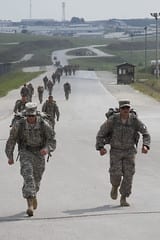If you follow the news carefully you will notice a subtle shift in the use of language, especially on college campuses.
Some high school and college students, with their teachers and professors, have repurposed military terms like trigger, aggression, and trauma. They use these terms in very different ways than warriors do and that leads to serious consequences for our culture. Even some academics are concerned with the trajectory of this way of speaking and thinking (e.g., Coddling of the American Mind by Jonathan Haidt and Greg Lukianoff).
Some of the more alarming tenets of this shift in thinking concern the understanding of pain and how it is something we must avoid at all costs. Feelings have become the only way to determine reality. The ultimate law has become: “If you don’t feel like it, don’t do it.” In stark contrast, warriors cannot survive with this way of thinking. We believe and proclaim:
 No pain, no gain.
No pain, no gain.- That which doesn’t kill me makes me stronger.
- Pain is temporary; pride is forever.
These quotes are a staple diet of military life. Pain and sacrificing personal desires for the good of the whole starts in basic training and continues with every field exercise, PT session, and deployment. Pain is part of a warrior’s ethos and their job description. We are willing to sacrifice because that’s what is required for victory.
The Christian Approach
Christians need to have a similar mindset. We can naively believe that culture doesn’t influence us, yet like children in a cultural “ocean,” we slowly drift from the safety of the shore. What can we do to keep our eyes fixed on the Lifeguard Station that doesn’t move?
The book of 1 Peter helps us fix our gaze. It’s about having the right mindset. “In all this you greatly rejoice, though now for a little while you may have had to suffer grief in all kinds of trials. These have come so that the proven genuineness of your faith—of greater worth than gold, which perishes even though refined by fire—may result in praise, glory and honor when Jesus Christ is revealed” (1 Peter 1:6–7).
Focus on God’s Activity
First, when we are in pain, we must focus on what God has done, is doing, and will continue to do in our lives. This in no way denies that pain and suffering are real. In making his point, Peter used a word from which we get our word “lupus,” a painful disease that can bring disfigurement. Pain is powerful and debilitating, but it’s not more powerful than God. Like a lifeguard station on the shore, a growing relationship with God is the stability we need to persevere through the pain.
See the Purpose
 Second, we need to see there is a purpose in our pain. This focus doesn’t take away the burden, but it makes sense of the burden. If we receive a command to carry a 70-pound rucksack for 10 miles, we will salute sharply and follow orders. But if we know we are carrying life-sustaining supplies for our family, we would probably run those 10 miles. The “why” drives the “what.”
Second, we need to see there is a purpose in our pain. This focus doesn’t take away the burden, but it makes sense of the burden. If we receive a command to carry a 70-pound rucksack for 10 miles, we will salute sharply and follow orders. But if we know we are carrying life-sustaining supplies for our family, we would probably run those 10 miles. The “why” drives the “what.”
Part of pain’s purpose is to test the authenticity of our faith. Like fire that refines gold, God uses pain, among other things, to refine us and our commitments to Him. Quitting is the easy option; staying in the fight for the long haul reveals character that has been tested and proved genuine over time.
The Call
The aches and pains we experience now are only temporary. There will be a day when all our pain goes away but until that time, we are called to set the example for a society that seems to have lost its bearings. Our experience and understanding of how to persevere through pain is needed now more than ever.
Will you renew your commitment to focus on God and find purpose in your pain?
In article photos in order of appearance: 120330-F-OC707-902 by the U.S. Air Force licensed under U.S. Govt. Work
Ruck March by the U.S. Army licensed under CC BY 2.0







